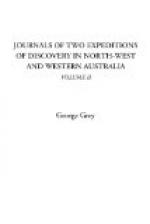Indeed the infinity of the native names of places, all of which are descriptive and appropriate, is of itself a prima facie evidence of their having strong ideas of property in the soil; for it is only where such ideas are entertained and acted on that we find, as is certainly the case in Australia, Nullum sine nomine saxum.
I am, my dear Friend,
Your’s very sincerely,
JOHN DUNMORE LANG.
To Dr. Hodgkin.
...
LAWS OF INHERITANCE AND TRESPASS. LINE OF INHERITANCE.
A father divides his land during his lifetime, fairly apportioning it amongst his several sons, and at as early an age as fourteen or fifteen they can point out the portion which they are eventually to inherit.
If the males of a family become extinct the male children of the daughters inherit their grandfather’s land.
CERTAIN LAWS REGARDING ARTICLES OF FOOD.
The punishment of trespass for the purpose of hunting, is invariably death, if taken in the fact, and at the very least an obstinate contest ensues. If the trespasser is not taken in the fact, but is recognised from his footmarks, or from any other circumstance, and is ever caught in a defenceless state, he is probably killed; but if he appears attended by his friends he is speared through the thigh, in a manner which will be mentioned under the head of punishments.
There are other laws intended for the preservation of food, such as that which enjoins that:
1. No vegetable production used by the natives as food should be plucked or gathered when bearing seed.
2. That certain classes of natives should not eat particular articles of food; this restriction being tantamount to game laws, which preserve certain choice and scarce articles of food from being so generally destroyed as those which are more abundant.
3. The law regarding the family kobongs, mentioned above.
Independent of these laws there are certain articles of food which they reject in one portion of the continent and which are eaten in another; and that this rejection does not arise from the noxious qualities of the article is plain, for it is sometimes not only of an innocent nature but both palatable and nutritious: I may take for example the unio, which the natives of South-west Australia will not eat because, according to a tradition, a long time ago some natives ate them and died through the agency of certain sorcerers who looked upon that shellfish as their peculiar property.
CHAPTER 12. CRIMES AND PUNISHMENTS.
Laws relative to Deaths and Punishments.
SUPERSTITIOUS REVENGE OF NATURAL DEATH.
The natives do not allow that there is such a thing as a death from natural causes; they believe that were it not for murderers or the malignity of sorcerers they might live for ever: hence:




